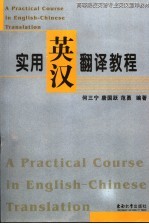图书介绍
实用英汉翻译教程PDF|Epub|txt|kindle电子书版本网盘下载

- 何三宁,唐国跃,范勇编著 著
- 出版社: 南京:东南大学出版社
- ISBN:7564100966
- 出版时间:2005
- 标注页数:326页
- 文件大小:12MB
- 文件页数:338页
- 主题词:写作/翻译
PDF下载
下载说明
实用英汉翻译教程PDF格式电子书版下载
下载的文件为RAR压缩包。需要使用解压软件进行解压得到PDF格式图书。建议使用BT下载工具Free Download Manager进行下载,简称FDM(免费,没有广告,支持多平台)。本站资源全部打包为BT种子。所以需要使用专业的BT下载软件进行下载。如BitComet qBittorrent uTorrent等BT下载工具。迅雷目前由于本站不是热门资源。不推荐使用!后期资源热门了。安装了迅雷也可以迅雷进行下载!
(文件页数 要大于 标注页数,上中下等多册电子书除外)
注意:本站所有压缩包均有解压码: 点击下载压缩包解压工具
图书目录
Chapter 1:A Brief Introduction to Translation 第1章 翻译简述1
1.1 What Is Translation什么是翻译1
1.2 The Makings of a Translator译者的素质3
1.2.1 A Translator Must Be Well Acquainted with the Source Language译者应熟练掌握原语3
1.2.2 A Translator Must Be Well Acquainted with the Target Language译者应熟练掌握目的语4
1.2.3 A Translator Must Be Armed with Professional Knowledge Needed译者应有丰富的专业知识5
1.3 Why We Study the Skills of Translating翻译技巧的重要性5
1.4 Criteria in Translating翻译原则6
1.4.1 Faithfulness to the Original忠实10
1.4.2 Smoothness and Expressiveness通顺11
1.5 Procedures in Translating翻译的过程11
1.5.1 The Procedure of Understanding理解12
1.5.2 The Procedure of Expressing表达15
1.5.3 The Procedure of Proofreading审校17
1.6 Six Major Trends of Translation翻译工作的六大趋势17
1.7 Ways to Success in Translation提高翻译水平之道19
1.7.1 Practice More多练20
1.7.2 Compare More多比20
1.7.3 Read More多读21
1.8 A Test in Class for Evaluation课堂评估测试26
Chapter 2:Lexical Translation 第2章 词法翻译27
2.1 Conversion of Word Classes词类转译27
2.1.1 Convert English Nouns into Chinese Verbs,Adjectives,or Adverbs英语名词转换成汉语动词、形容词或副词27
2.1.2 Compare and Analyze比较与分析30
2.1.3 Exercises练习31
2.1.4 Convert English Adjectives into Chinese Adverbs,Verbs or Nouns英语形容词转换成汉语副词、动词或名词32
2.1.5 Compare and Analyze比较与分析34
2.1.6 Exercises练习35
2.1.7 Convert English Adverbs into Chinese Nouns,Verbs or Adjectives英语副词转换成汉语名词、动词或形容词37
2.1.8 Convert English Verbs into Chinese Nouns英语动词转换成汉语名词39
2.1.9 Convert English Prepositions into Chinese Verbs英语介词转换成汉语动词39
2.1.10 Compare and Analyze比较与分析41
2.1.11 Exercises练习42
2.2 Omission and Amplification省词与增词翻译44
2.2.1 Omission省词翻译44
2.2.2 Compare and Analyze比较与分析51
2.2.3 Exercises练习52
2.2.4 Amplification增词翻译53
2.2.5 Compare and Analyze比较与分析62
2.2.6 Exercises练习63
Chapter 3:Semantic Translation 第3章 语义翻译65
3.1 Diction遣词用字65
3.1.1 Polysemy一词多义66
3.1.2 Extension词义引申68
3.1.3 Word Classes一词多性71
3.2 Principles in Diction选词的原则72
3.2.1 Select Word Meaning According to Word Classes依据词性选择词义72
3.2.2 Decide Word Meaning According to the Contextual and Logical Relationship依据上下文与逻辑关系选择词义72
3.2.3 Translate Literally without Any Extension字面直译73
3.2.4 Suit Words or Phrases to Chinese Description依汉语的表达习惯译73
3.3 Commendatory and Derogatory词义的褒贬74
3.4 Compare and Analyze比较与分析76
3.5 Exercises练习77
Chapter 4:How to Translate the Negative 第4章 否定句的翻译80
4.1 Complete Negation完全否定80
4.2 Partial Negation部分否定81
4.2.1 All(every,each,both,many,everything,everybody...)+not 不定代词/形容词+not结构的翻译81
4.2.2 Always(much,everywhere,entirely,wholly,altogether,often,enough...)+not 副词+not结构的翻译83
4.2.3 Not+Adverbial(attributive/predicative)+and+Adverbial(attributive/predicative) not+状语+and+状语结构的翻译84
4.2.4 "...Not...+...as Well as..."Structure "...not...+...as well as..."结构的翻译85
4.2.5 Some Adverbials with Partial Negation部分否定意义副词的翻译85
4.3 Compare and Analyze比较与分析86
4.4 Exercises练习87
4.5 Double Negation双重否定的翻译88
4.6 Connotative Negation内涵否定的翻译89
4.6.1 Some Words and Phrases含有否定意义词语的翻译90
4.6.2 Some Sentence Structures句子结构的否定翻译92
4.7 Compare and Analyze比较与分析93
4.8 Exercises练习95
4.9 Transferred Negation否定转移96
4.9.1 Some English Verbs一些英语动词的翻译96
4.9.2 "Not...because..."Construction “not...because...”结构的翻译97
4.10 Affirmative in Meaning含有否定词的肯定翻译98
4.11 Conversion between Positive and Negative正反译法99
4.12 Compare and Analyze比较与分析101
4.13 Exercises练习102
Chapter 5:How to Translate Numbers 第5章 数字的翻译105
5.1 Some English Numbers一些英语数字的翻译105
5.2 Translation of Approximate Numbers约数的翻译108
5.3 Compare and Analyze比较与分析110
5.4 Exercises练习112
5.5 Translation of English Multiple英语倍数的翻译114
5.5.1 Some Sentence Constructions as to Increase用于增长中常见句型的翻译114
5.5.2 Some Words,Phrases and Structures as to Decrease用于减少中常见词语和句型的翻译117
5.6 Compare and Analyze比较与分析119
5.7 Exercises练习119
Chapter 6:How to Translate the Passive 第6章 被动概念的翻译121
6.1 Some Suffixes with Passive Meaning含有被动意义的后缀121
6.2 Most Past Participles with Passive Meaning含有被动意义的过去分词122
6.3 Common Methods of Translating the Passive Voice被动句的翻译方法122
6.3.1 Convert the Passive-Voice English into the Active-Voice Chinese英语被动句转换成汉语主动句123
6.3.2 Convert Passive-Voice English Sentences into Be-Verb Chinese Sentences英语被动句转换成含“是”的汉语句124
6.3.3 Convert Passive-Voice English Sentences into Subjectless Chinese Sentences英语被动句转换成汉语无主语句125
6.3.4 Convert Passive-Voice English Sentences into Passive-Form Chinese Sentences用含有被动概念的词翻译英语被动句126
6.3.5 Convert By-Agent and Recipient into Cause-and-Effect行为者与接受者转换成因果关系128
6.3.6 Some Useful Patterns一些常用的句型129
6.4 Compare and Analyze比较与分析130
6.5 Exercises练习132
Chapter 7:How to Translate Long Sentences 第7章 长句的翻译135
7.1 General Procedures of Translating Long English Sentences长句翻译的总体原则135
7.2 Some Useful Techniques of Translating Long English Sentences长句翻译的方法136
7.2.1 Division分译136
7.2.2 Sequential-Order Translation of Long Sentences顺译137
7.2.3 Reverse-Ordcr Translation倒译138
7.2.4 Insertion插入译法139
7.2.5 Comprehensive Use of Different Techniques综合译法140
7.3 Compare and Analyze比较与分析142
7.4 Exercises练习143
Chapter 8:Translation of Practical Texts 第8章 应用文体的翻译145
8.1 Translation of English for Science and Technology科技英语的翻译145
8.1.1 Stylistic Characteristics of EST科技英语文体特点146
8.1.2 Techniques of EST Translation科技英语翻译方法153
8.1.3 Compare and Analyze比较与分析169
8.1.4 Exercises练习171
8.2 Translation of Legal Documents法律文献的翻译172
8.2.1 Lexical Features of Legal Documents and Their Translation法律文献的用词特点及其翻译172
8.2.2 Syntactical Features of Legal Documents and Their Translation法律文献的句法特点及其翻译178
8.2.3 Compare and Analyze比较与分析184
8.2.4 Exercises练习187
8.3 Translation of English Advertisement英文广告的翻译188
8.3.1 General Introduction of Advertisement英文广告简述188
8.3.2 Basic Purposes and General Principles of English Advertisement Translation into Chinese英文广告翻译的目的与总体原则188
8.3.3 Linguistie Characteristics of English Advertisements and Relevant Translation Techniques英文广告的语言特点及其翻译方法189
8.3.4 Rhetorical Devices Used in English Advertisements英文广告中的修辞方法196
8.3.5 Some Typical Translation Methods of English Advertisements and General Re-quirements for Each Method英文广告中常用的翻译方法及要求202
8.3.6 Compare and Analyze比较与分析208
8.3.7 Exercises练习210
Chapter 9:Cultural Translation 第9章 文化翻译211
9.1 Differences between"Culture"in English and文化in Chinese汉英文化的差异211
9.2 Relationship between Culture and Language文化与语言的关系213
9.3 Lexical Translation in Culture文化中的词义翻译214
9.3.1 Words and Conceptual Meaning单词与概念意义216
9.3.2 Words and Associative Meaning单词与联想意义220
9.3.3 Compare and Analyze比较与分析233
9.3.4 Exercises练习234
9.4 Cultural Connotations of the Idiomatic Phrases and Their Translation习语的文化内涵与翻译235
9.4.1 Set Phrases and Their Translation成语的翻译235
9.4.2 Proverbs and Their Translation谚语的翻译240
9.4.3 Allusions and Their Translation典故的翻译249
9.5 Cultural Connotations of Euphemisms and Their Translation委婉语的文化内涵与翻译253
9.5.1 General View to Euphemisms委婉语概述253
9.5.2 Methods of Translating Euphemisms委婉语的翻译方法255
9.6 Compare and Analyze比较与分析257
9.7 Exercises练习260
Chapter 10:Some Terms in Translation and Their Understanding 第10章 一些翻译术语及其理解262
10.1 Metaphrase and Paraphrase直译与意译262
10.2 Dissimilation and Assimilation异化与同化266
10.2.1 Dissimilation异化266
10.2.2 Assimilation同化268
10.2.3 Relationship between Dissimilation and Assimilation异化与同化的关系269
10.3 Exercises练习272
10.4 Flexibility and Accuracy灵活与准确273
10.5 Fuzziness and Accuracy模糊与精确275
10.6 Exercises练习277
10.7 Rhythm and Flavor节奏与韵味278
10.7.1 Thought-Rhythm意义节奏278
10.7.2 Sound-Rhythm声音节奏281
10.8 Sentence and Text句子与语篇282
10.9 Exercises练习286
Appendix 1 Bilingual Reading对比阅读287
Appendix 2 Common Titles常用头衔309
Appendix 3 Common Expressions for Signs常用标志语313
Appendix 4 Topics for Consideration in Theses on Translation论文参考题目321
Appendix 5 Recommended Reading List阅读书目323
Appendix 6 Bibliography参考文献324